Science fiction and fantasy (and various other genres) often feature couples whose affection for each other is unassailable, thanks to the unparalleled virtues possessed by both of the partners. However, there are also great romances that are notable because the people involved are NOT peerless paragons who are easy to love. Rather, these relationships are memorable because one partner’s deep flaws in no way inhibit the other’s sincere love.
Perhaps some examples would be appropriate. Here are five.
Melissa Khan and Cletus Grahame from Gordon R. Dickson’s Tactics of Mistake (1971)
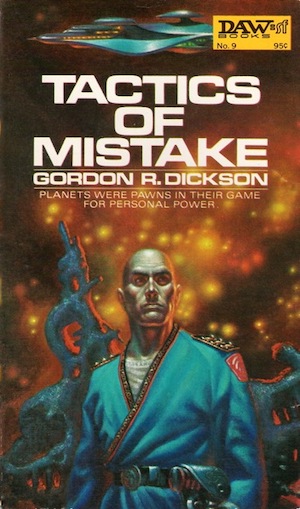
Western Alliance officer Cletus Grahame’s conviction that he has the insight to revolutionize military strategy takes him to the stars. Provided the opportunity to put his theories into practice, Cletus goes from victory to victory. Even defeats eventually are revealed as successes.
Nowhere is this truer than on the battlefield of romance. Objective observers might well describe Cletus’ courtship of Melissa as somewhere between comprehensively inept to forthrightly hostile (romance is a professional impediment, you see). Nevertheless, Melissa is convinced Cletus loves her. Thus, despite his best efforts to fend off true love, in the end Cletus gets the girl. Or more accurately, Melissa gets her soldier.
A cynic reading Tactics of Mistake might speculate that success comes less from Cletus’ unparalleled genius than the fact the author keeps one thumb firmly on the scales, ensuring Cletus’ enemies obliviously wander into every trap Cletus sets for them, no matter how obvious the gambit. Melissa’s dogged pursuit of the frankly off-putting Cletus is part of the pattern. Even when he loses, Cletus wins.
Kuroe and Arata from Spica Aoki’s Kaiju Girl Caramelise (2018 onward)
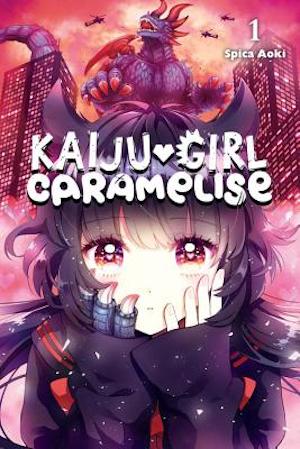
High-school idol Arata and school outcast Kuroe seem an odd romantic couple to schoolmates. Unlike his superficial chums, Arata can see the true Kuroe under her defensive reclusiveness. Arata’s canny insight enables him to perceive lovable virtues others overlook, which makes it even odder that Arata habitually overlooks the physical quirk Kuroe is desperate to conceal. Occasionally, when stressed, Kuroe transforms into the office-building size kaiju Harugon. By occasionally, I mean frequently. Adolescence is inherently stressful.
There is a long tradition of people with secret identities concealing their other identity from significant others for fear of rejection or worse. Kuroe would be one example. However, it’s very clear in this case that Arata doesn’t care about appearances. Even if he were forced to acknowledge that Kuroe and Harugon are the same person, Arata’s feeling wouldn’t change. (But try convincing Kuroe of that…)
Moon and Sparks from Joan D. Vinge’s The Snow Queen
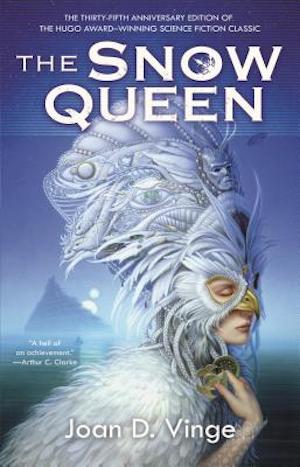
Sweethearts Moon and Sparks are separated by destiny and time. Destiny: Sparks resents the fact that Moon is a sibyl, while Sparks is not. Time: Moon becomes an unwilling relativistic traveler. Years pass before she can return to her native world—years a bitter Sparks uses to become the debauched plaything of planetary ruler Arienrhod. Can Moon’s love redeem her fallen lover?
In Spark’s defense Moon is, for reasons too complex to explain, Arienrhod’s illicit clone. It makes sense that if he found one attractive, he would fall for the other as well. However, a question more important than “can Moon’s love redeem her fallen lover?” is “is there any evidence at all that spoiled man-child Sparks is redeemable?” As presented in the novel, the answer is “no.”
The author did eventually make an author’s saving throw, replacing the comprehensively deplorable Sparks as love interest with the morose, unlucky, but relentlessly reliable BZ Gundhalinu. That had to wait for the sequel, The Summer Queen.
Anthony Rogers and Wilma Deering from Philip Francis Nowlan’s Armageddon 2419 A.D. (1928)
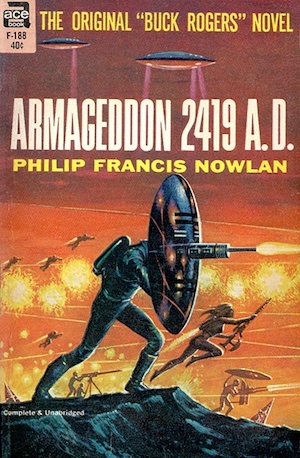
[Note: The publication date is somewhat complicated by the fact the 1960s novel published as Armageddon 2419 A.D. was a fixup of the 1928 novella Armageddon 2419 A.D. and its 1929 sequel The Airlords of Han.]
Waking after centuries to find America a nation long colonized by the Han. Anthony Rogers joins with Wilma Deering and her fellow Americans in their effort to liberate America from tyranny. The struggle provides Anthony with ample opportunity to notice and appreciate Wilma’s many sterling qualities. It’s no surprise that he falls in love with her.
However, his memoirs make clear that Rogers is both aware of and eager to explain away one notable quirk: Wilma’s genocidal fury towards the Han people. Rogers’ initial defense is to point out that Wilma is quite gracious towards people of other races aside that one specific exception. Perhaps feeling “she’s only murderously racist towards one group” is rather insufficient, Rogers then offers a defense best described as “deeply unfortunate” and “something you will regret asking about.”
It says something about the unseemly enthusiasm with which Wilma pursues her vendetta that the lead character in a Yellow Peril novel feels he has to take the time to excuse his love interest’s homicidal proclivities. It’s not terribly surprising that that aspect of the story was dropped in the Buck Rogers comic strip adaptation.
Lord Chup and Lady Charmian from Fred Saberhagen’s Empire of the East (1978)
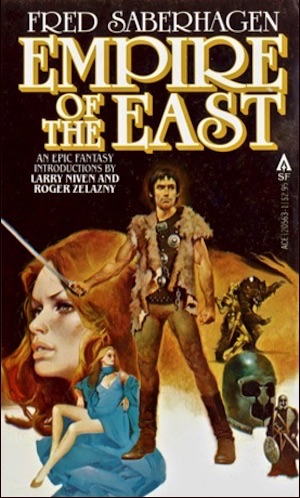
In a world dominated by the corrupt and malevolent Empire of the East, Lord Chup stands out as one of the Empire’s few pragmatists. Eschewing sadism as beneath him, Lord Chup’s cruelties always have some useful goal in mind. It’s not terrible surprising, therefore, that he eventually rejects the Empire’s often counter-productive decadence to join the rebel alliance.
There is a singular exception to Lord Chup’s pragmatism, which is his devotion to his wife, Lady Charmian. The ambitious Lady Charmian makes frequent attempts to betray and murder Lord Chup. He is not a love-blinded fool; he is entirely aware of his wife’s true nature. He loves her anyway.
***
There were many examples that came to mind but didn’t quite make the cut (Mary O’Meara, for one). Perhaps one of your favorites was omitted. If so, feel free to mention them in comments below.
In the words of fanfiction author Musty181, four-time Hugo finalist, prolific book reviewer, and perennial Darwin Award nominee James Davis Nicoll “looks like a default mii with glasses.” His work has appeared in Interzone, Publishers Weekly and Romantic Times as well as on his own websites, James Nicoll Reviews (where he is assisted by editor Karen Lofstrom and web person Adrienne L. Travis) and the 2021, 2022, and 2023 Aurora Award finalist Young People Read Old SFF (where he is assisted by web person Adrienne L. Travis). His Patreon can be found here.










